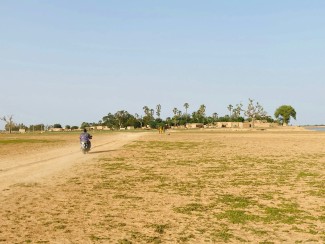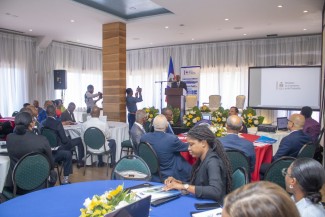|
|
|
The least developed country (LDC) category was created to allow for specific forms of support to be extended to these countries, as they were lagging when compared to other developing countries. Graduation indicates the development gap – if not closed – has been narrowed. It also implies a change in the package of support a country receives from its development partners.
The role of LDC-specific support measures in a country’s development path tends to differ among countries, as conditions vary. However, LDCs benefitting from this support will need to adjust to its withdrawal. While it is well accepted that a transition strategy is necessary to guide this process, the existing package to support that transition needs to be strengthened. The approaching Fifth UN Conference on the LDCs (UNLDC-V) provides an excellent occasion to do so.
Smooth transition to long-term development
The achievement of sustainable development is a continuous, evolving process. Thus, graduation should not be considered as a rupture but as a stage in a country’s development path. Planning for this new phase is necessary due to the changes graduation implies for the assistance received.
Continued support from development partners is essential. Graduating countries will need strong institutional capacities to navigate their new development cooperation landscape, to compete for finance and market shares, to implement the disciplines of international agreements they had been exempted from, and to conduct development-effective negotiations with official and private partners. Currently, there is little guidance on how countries could proceed and how much support they can expect to adjust to their new circumstances.
Strengthening policy advice…
A possible way ahead is to make better use of existing tools and mechanisms. The Impact Assessment, a report that identifies LDC-specific support utilised by a graduation-eligible LDC, is a case in point. Greater participation by UN agencies operating in the country and whose work could be potentially affected by graduation is needed. Currently, this participation is limited.
Furthermore, at the country’s request, the report could go beyond its current scope and include an Addendum covering policy advice and guidance on the very first steps and possible actions the country would need to consider. Among others, the Addendum could consider possible institutional arrangements required for managing the transition process. It could provide guiding questions regarding areas where additional data are needed to better assess the impact of graduation and inform policy making. It could contemplate broad policy options to address the consequences of graduation.
The expanded report would then be reviewed by the Committee for Development Policy (CDP), the organ responsible for making graduation recommendations to the UN Economic and Social Council. The Committee’s conclusions and recommendations would be shared with the country concerned and its development partners thus providing the initial steps of a roadmap towards transition.
...including improved coordination within the UN system
Better coordination within the UN system is also necessary. Presently, the legislative and operational arms of the UN are not communicating well with one another, and the potential changes brought about by graduation are not duly considered locally.
At the country level, UN system support is delineated by the United Nations Development Assistance Framework (UNDAF) and centred on the implementation of the 2030 sustainable development agenda. A Common Country Assessment is prepared to identify immediate national challenges and inform the design of UN policies and programmes locally. LDC status or upcoming graduations are rarely addressed in these reports. While UNDAF is the most suitable locus for a graduating country to request and receive guidance on its transition strategy, the framework needs to be attuned to the graduation process.
The Impact Assessment provides relevant information on upcoming national challenges and should be treated as an input to the UNDAF process. This would help graduating countries to bridge the gap between the CDP process and actions required at the country level. Mainstreaming of smooth transition into UNDAF would guarantee that the adjustment to graduation conditions would be compatible with and contribute to the achievement of broader sustainable development goals. Graduating countries should have a more active role in ensuring that this happens.
Rationalisation and better use of monitoring reports
Currently, a series of monitoring reports on the country’s development progress, before and after graduation, is prepared. The number of such reports varies between eight and 11 per country, while the monitoring exercise may last up to 15 years!
The usefulness of this exercise is unclear. First, country participation is far from optimal. Second, findings of the monitoring get buried in the CDP report and are not sufficiently discussed at the relevant intergovernmental processes. Third, the monitoring reports seem to be redundant. There are already numerous recurrent studies prepared by international organisations on development trends in these economies, supplying a wealth of information and policy analysis.
To be useful, monitoring reports should provide the graduating and graduated countries with additional insights and options on the implementation of their smooth strategy and alert the international development partnership of challenges being confronted.
Ideally, monitoring reports should be reduced in number and better integrated to international review processes, such as the Programme of Action for the LDCs and the national voluntary reviews of the Agenda 2030. This way, smooth transition would be better linked to the implementation of the Sustainable Development Goal agenda and treated as one of its components.
At the national level, the UNDAF monitoring process could anchor and support the country’s own monitoring reviews.
Improving the phasing out of support measures
Lastly, the phasing out of support measures needs to be reconsidered and improved upon.
Official development assistance continues to be an important source of finance for the LDCs. Access and graduation from concessional funds provided by international financial organisations (IFIs) are not determined by LDC status, but this may not be the case of official bilateral flows.
Graduation may imply inflows extended at less favourable terms. Donor countries should consider extending LDC terms to graduated countries if these countries still maintain their eligibility to concessional finance from the IFIs. This suggestion also enhances coherence in the international development finance architecture by better aligning donors’ policies with one another.
Access to concessional climate finance is crucial for environmentally fragile LDCs. Yet, dedicated funds are no longer available at some point after graduation. Graduated countries will have to compete for funds and expertise in a complex climate support architecture. Often LDCs lack knowledge of how to proceed to tap these non-exclusive resources. Thus, initiatives such as the LDC Fund of the Global Environment Facility could envisage an exit training component and provide graduating countries with information on available resources and on the actions required to tap other existing initiatives, including how to get assistance to prepare and submit project proposals.
This measure should not be restricted to climate funds. Graduation workshops and exit training exercises by LDC-dedicated initiatives should be an integral part of the new framework for graduation support. For example, the Enhanced Integrated Framework (EIF) could coordinate country-specific capacity building programmes, at the graduating countries’ request, on how to approach the implementation of World Trade Organization disciplines they were exempted from as LDCs.
Adjusting the phasing out of support measures as suggested here will enable graduating countries to have a better understanding of the relevant issues ahead of them and be empowered with the tools to effectively access support available to them as non-LDCs.
-------
Ana Luiza Cortez is international consultant and former Secretary of the Committee for Development Policy.
If you would like to reuse any material published here, please let us know by sending an email to EIF Communications: eifcommunications@wto.org.



